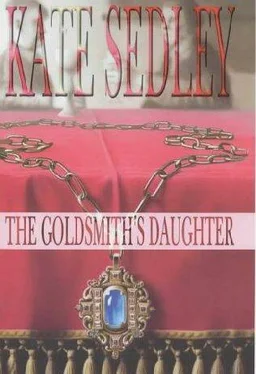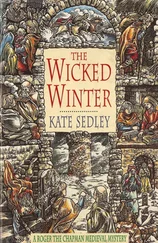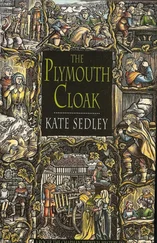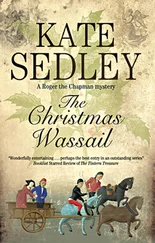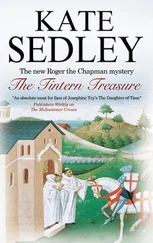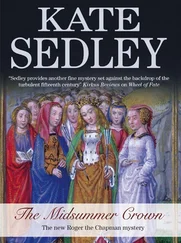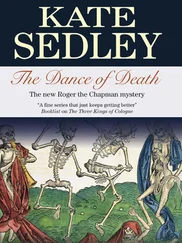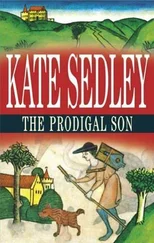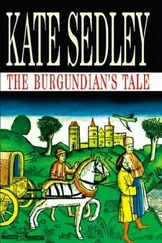Kate Sedley - The Goldsmith's daughter
Здесь есть возможность читать онлайн «Kate Sedley - The Goldsmith's daughter» весь текст электронной книги совершенно бесплатно (целиком полную версию без сокращений). В некоторых случаях можно слушать аудио, скачать через торрент в формате fb2 и присутствует краткое содержание. Жанр: Исторический детектив, на английском языке. Описание произведения, (предисловие) а так же отзывы посетителей доступны на портале библиотеки ЛибКат.
- Название:The Goldsmith's daughter
- Автор:
- Жанр:
- Год:неизвестен
- ISBN:нет данных
- Рейтинг книги:5 / 5. Голосов: 1
-
Избранное:Добавить в избранное
- Отзывы:
-
Ваша оценка:
- 100
- 1
- 2
- 3
- 4
- 5
The Goldsmith's daughter: краткое содержание, описание и аннотация
Предлагаем к чтению аннотацию, описание, краткое содержание или предисловие (зависит от того, что написал сам автор книги «The Goldsmith's daughter»). Если вы не нашли необходимую информацию о книге — напишите в комментариях, мы постараемся отыскать её.
The Goldsmith's daughter — читать онлайн бесплатно полную книгу (весь текст) целиком
Ниже представлен текст книги, разбитый по страницам. Система сохранения места последней прочитанной страницы, позволяет с удобством читать онлайн бесплатно книгу «The Goldsmith's daughter», без необходимости каждый раз заново искать на чём Вы остановились. Поставьте закладку, и сможете в любой момент перейти на страницу, на которой закончили чтение.
Интервал:
Закладка:
We thanked him and prepared to take our leave, not without protests from both our hosts. But I felt that the sooner we were settled, the happier I should be, so without more ado I picked up the big linen satchel in which we had brought a change of clothing and slung it over one shoulder. (I had not, after all, brought my pack, having been dared to do so on pain of my wife’s deepest displeasure. And an unexpected gift of money from Margaret Walker had made it easier for me to comply with Adela’s wishes.)
We left matters that if the Lampreys heard no more from us before nightfall, they could safely assume that we had been successful in finding lodgings at the Voyager, and that they would call for us there the following morning. Adela and I would spend the remainder of the short January day exploring the delights of West Cheap.
January the fifteenth dawned cold and grey, with a dank mist rising slowly from the river. But the weather in no way dampened the spirits of the crowds gathered in the vicinity of the Chapel of Saint Stephen at Westminster.
My wife and I had been successful in finding lodgings at the Voyager in Bucklersbury, and had taken an immediate liking to the landlord. Reynold Makepeace was a short, stocky man of some fifty summers, with a large paunch, sparse brown hair, bright hazel eyes and surprisingly good teeth, who exuded warmth and friendliness; and he had offered us a small but cheap and clean room, opening off an outside gallery that ringed three sides of the inn’s inner courtyard. The bed, which took up most of the space, had a goosefeather mattress and big, down-filled pillows, with the result that we had slept like logs and risen that morning refreshed both in body and spirit.
Mind you, we had been very tired, having spent the rest of yesterday’s daylight hours as we had intended, exploring the delights of West Cheap. Adela had drunk at the Great Conduit, rebuilt and enlarged during King Edward’s reign, its crystal-clear water piped in from the spring whose source is to be found in the fields around Paddington. Then we had given thanks for our safe arrival at the Church of Saint Mary-le-Bow, so called because of its underpinning of stone arches. And, finally, as we approached Saint Paul’s, visible at the top of Lud Gate hill, its steeple crowned with a copper-gilt weathercock, we had feasted our eyes on the magnificent display of wares in the windows of the goldsmiths’ shops.
I’ve heard it said that there are more goldsmiths’ shops crowded together in West Cheap, and spilling over into neighbouring Gudrun and Foster Lanes, than there are in the whole of Milan, Rome and Venice put together. Whether this claim is justified or not I have no means of knowing, never having visited any of those three cities; but I do know that even on a dull January afternoon, our eyes were positively dazzled by the gleam of gold and silver, of precious and semi-precious gems. Rings, necklaces and brooches, ewers, mazers and plates, ornately decorated salt-cellars, chalices and candlesticks all glittered in the fading light.
Outside each shop had stood the apprentices, touting their masters’ wares, but secretly, I suspected, longing for curfew and the chance to remove themselves and the merchandise indoors. One undersized lad with a shock of wavy brown hair, who seemed to have no companion, had given up even the pretence of attracting custom, and was leaning against the door jamb, idly watching the passers-by and yawning behind his hand. Adela, smiling sympathetically, had drawn my attention to him, and even as I followed her pointing finger, an elderly man, spectacles perched on the bridge of his nose, had leaned from an overhanging upstairs window and severely reprimanded the boy.
After that, we had had just time enough to walk along Paternoster Row, where the rosary makers have their shops, and where there are also one or two fine private houses, before the bells had rung for Vespers, and we had made part of the mass of people crowding into Saint Paul’s. Even the lawyers, who daily conduct their business in the cloisters, had stopped advising or haranguing their clients in order to join in the service; although as soon as it was over, they returned eagerly to the business in hand. (Time, I have often heard it said, is money where the legal fraternity is concerned.)
Now, with a good night’s rest behind us, and a breakfast of bacon collops and oatmeal cakes to warm our stomachs, we were outside Saint Stephen’s Chapel awaiting the arrival of the bride and groom. True to their word, Philip and Jeanne Lamprey had called for us at the Voyager, and during our walk to Westminster, Adela had had her first good look at the Strand with its splendid dwellings, their gardens running down to the water’s edge, and at the beautiful, if crumbling, Chère Reine Cross, that monument to the power of true love.
We had, fortunately, arrived early enough to position ourselves close to the main entrance to the chapel, and so had a clear view of the interior, ablaze with candles, the walls glowing with the rich reds and greens, purples and blues of tapestries. Jeanne, with womanly forethought, had brought a cushion, so that Adela, whenever she grew tired of standing, was able to sit down on the steps.
Jeanne could also enlighten us as to the identity of some of the guests and members of the royal family. The little Prince of Wales, she said, was not present, being, presumably, hard at work at his lessons in distant Ludlow Castle; but the magnificent gentleman just entering the chapel door was his guardian and uncle, Earl Rivers, the Queen’s eldest brother. And behind him were the Queen’s two sons by her first marriage, the Marquess of Dorset and his younger brother, Lord Richard Grey. And here were the four princesses, sisters of the groom. The eldest, Elizabeth, some eleven or twelve years old, was clutching the hand of the baby, Anne, and turning every now and then to frown at the other two — ‘Mary and Cicely,’ Jeanne hissed in Adela’s ear — who showed a deplorable tendency to shuffle their feet and cough and admire one another’s dresses in high-pitched, penetrating whispers, much to the amusement of the crowd.
There were many more guests, some of whom I remember clearly, and some of whom I cannot recollect at all. Amongst those I do recall are the little bride’s mother, the Dowager Duchess of Norfolk, resplendent in violet cloth-of-gold, and the King’s sister, Elizabeth, talking animatedly to her husband, the Duke of Suffolk. His heavy, surly features unexpectedly creased into a grin before they disappeared inside the chapel, the Earl of Lincoln, their eldest son, hard on their heels. The Duke of Buckingham was eye-catchingly attired in silver and green, and arrived in the company of Lord John Howard, a cousin of the Mowbrays (or so someone behind conveniently informed us). They were followed by a plump, but very pretty woman, in a gown and veil of pale blue sarcenet that defied the January cold, and which seemed to sparkle as she moved. At her appearance, a low murmur of disapproval rippled through the crowd.
‘Who’s that?’ asked Adela.
‘The King’s chief mistress, Jane Shore,’ was the prompt reply. ‘The people don’t care for her because she isn’t noble. She was plain Jane Lambert, daughter of a London mercer, before she married a goldsmith by the name of William Shore. They say she first caught the King’s eye on his return from France, two and a half years ago. And I’ve heard it rumoured,’ Jeanne continued, warming to her theme, ‘that the Marquess of Dorset and Lord Hastings — that was Lord Hastings who went in earlier, in the scarlet and black — are both extremely enamoured of her and are hoping that the King gets tired of her very soon.’
My wife’s smiling face told me that she was enjoying her visit to London even more than she had expected to do. These intriguing glimpses into the lives of the royal family and the court made her feel part of a wider, less parochial world than the one she normally inhabited.
Читать дальшеИнтервал:
Закладка:
Похожие книги на «The Goldsmith's daughter»
Представляем Вашему вниманию похожие книги на «The Goldsmith's daughter» списком для выбора. Мы отобрали схожую по названию и смыслу литературу в надежде предоставить читателям больше вариантов отыскать новые, интересные, ещё непрочитанные произведения.
Обсуждение, отзывы о книге «The Goldsmith's daughter» и просто собственные мнения читателей. Оставьте ваши комментарии, напишите, что Вы думаете о произведении, его смысле или главных героях. Укажите что конкретно понравилось, а что нет, и почему Вы так считаете.
